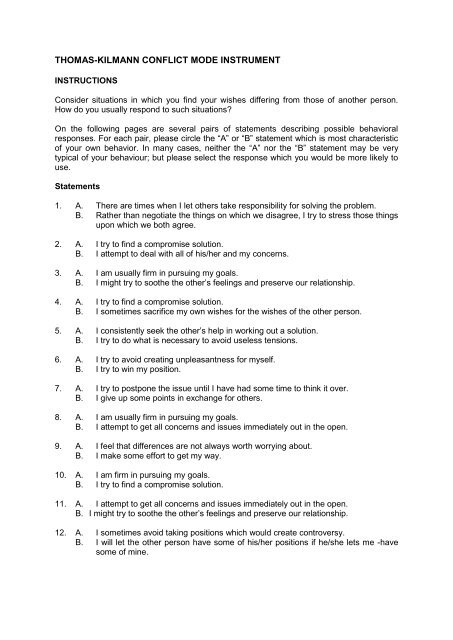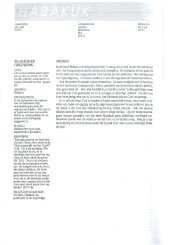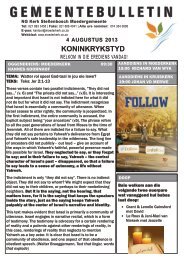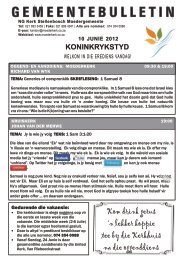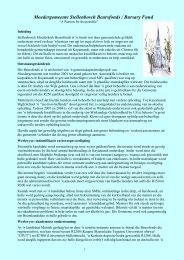THOMAS-KILMANN CONFLICT MODE INSTRUMENT - Kruiskerk
THOMAS-KILMANN CONFLICT MODE INSTRUMENT - Kruiskerk
THOMAS-KILMANN CONFLICT MODE INSTRUMENT - Kruiskerk
- No tags were found...
Create successful ePaper yourself
Turn your PDF publications into a flip-book with our unique Google optimized e-Paper software.
If you scored Low:1. Do you often feel powerless in situations?(It may be because you are unaware of the power you do have,unskilled in its use, or uncomfortable with the idea of using it. This mayhinder your effectiveness by restricting your influence.)2. Do you have trouble taking a firm stand, even when you see the need?(Sometimes concerns for others’ feelings or anxieties about the use of powercause us to vacillate, which may mean postponing the decision and adding tothe suffering and/or resentment of others.)B. Joint Problem SolvingUses:1. To find an integrative solution when both sets of concerns are tooimportant to be compromised.2. When your objective is to learn - e.g., testing your own assumptions,understanding the views of others.3. To merge insights from people with different perspectives on aproblem.4. To gain commitment by incorporating other’s concerns into aconsensual decision.5. To work through hard feelings which have been interfering with aninterpersonal relationship.If you scored High:1. Do you spend time discussing issues in depth that do not seem todeserve it?(Collaboration takes time and energy - perhaps the scarcestorganizational resources. Trivial problems don’t require optimalsolutions, and not all personal differences need to be hashed out. Theoveruse of collaboration and consensual decision making sometimesrepresents a desire to minimize risk - by diffusing responsibility for adecision or by postponing action.)2. Does your collaborative behavior fail to elicit collaborative responsesfrom others?(The exploratory and tentative nature of some collaborative behaviormay make it easy for others to disregard collaborative overtures; or thetrust and openness may be taken advantage of. You may be missingsome cues which would indicate the presence of defensiveness, strongfeelings, impatience, competitiveness, or conflicting interests.)
If you scored Low:1. Is it hard for you to see differences as opportunities for joint gain - asopportunities to learn or solve problems?(Although there are often threatening or unproductive aspects ofconflict, indiscriminate pessimism can prevent you from seeingcollaborative possibilities and thus deprive you of the mutual gains andsatisfactions which accompany successful collaboration.)2. Are subordinates uncommitted to your decisions or policies?(Perhaps their own concerns are not being incorporated into thosedecisions or policies.)C. CompromisingUses:1. When goals are moderately important, but not worth the effort orpotential disruption of more assertive modes.2. When two opponents with equal power are strongly committed tomutually exclusive goals - are in labor-management bargaining.3. To achieve temporary settlements to complex issues.4. To arrive at expedient solutions under time pressure.5. As a backup mode when collaboration or competition fails to besuccessful.If you scored High:1. Do you concentrate so heavily upon the practicalities and tactics ofcompromise that you sometimes lose sight of larger issues - principles,values, long 1 ’term objectives, company welfare?2. Does an emphasis on bargaining and trading create a cynical climateof gamesmanship? (Such a climate might undermine interpersonaltrust and deflect attention away from the merits of the issuesdiscussed.)If you scored Low:1. Do you find yourself too sensitive or embarrassed to be effective inbargaining situations?2. Do you find it hard to make concessions?(Without this safety valve, you may have trouble getting gracefully out ofmutually destructive arguments, power struggles, etc.)D. AvoidingUses:1. When an issue is trivial, of only passing importance, or when other moreimportant issues are pressing.2. When you perceive no chance of satisfying your concerns - e.g., whenyou have low power or you are frustrated by something which would bevery difficult to change (national policies, someone’s personalitystructure, etc.)
3. When the potential damage of confronting a conflict outweighs thebenefits of its resolution.4. To let people cool down - to reduce tensions to a productive level andto regain perspective and composure.5. When gathering more information outweigh the advantages of animmediate decision.6. When others can resolve the conflict more effectively.6. When the issue seems tangential or symptomatic of another morebasic issue.If you scored High:1. Does your coordination suffer because people have trouble gettingyour inputs on issues?2. Does it often appear that people are “walking on eggshells?”(Sometimes a dysfunctional amount of energy can be devoted tocaution and the avoiding of issues, indicating that issues need to befaced and resolved.)3. Are decisions on important issues made by default?If you scored Low:1. Do you find yourself hurting peoples’ feelings or stirring up hostilities?(You may need to exercise more discretion in confronting issues ormore tact in framing issues in non-threatening ways. Tact is partiallythe art of avoiding potentially disruptive aspects of an issue.)2. Do you often feel harried or overwhelmed by a number of issues? (Youmay need to devote more time to setting priorities - deciding whichissues are relatively unimportant and perhaps delegating them toothers.)E. AccommodatingUses:1. When you realize that you are wrong-to allow a better position to beheard, to learn from others, and to show that you are reasonable.2. When the issue is much more important to the other person than toyourself - to satisfy the needs of others, and as a goodwill gesture tohelp maintain a cooperative relationship.3. To build up social credits for later issues which are important to you.4. When continued competition would only damage your cause - whenyou are outmatched and losing.5. When preserving harmony and avoiding disruption are especiallyimportant.6. To aid in the managerial development of subordinates by allowing themto experiment and learn from their own mistakes.
If you scored High:1. Do you feel that your own ideas and concerns are not getting theattention they deserve?(Deferring too much to the concerns of others can deprive you of influence,respect, and recognition. It also deprives the organization ofyour potential contributions.)2. Is discipline lax?(Although discipline for its own sake may be of little value, there areoften rules, procedures, and assignments whose implementation iscrucial for you or the organization.)If you scored Low:1. Do you have trouble building goodwill with others? (Accommodation onminor issues which are important to others are gestures of goodwill.)2. Do others often seem to regard you as unreasonable?3. Do you have trouble admitting it when you are wrong?4. Do you recognize legitimate exceptions to rules?5. Do you know when to give up?


